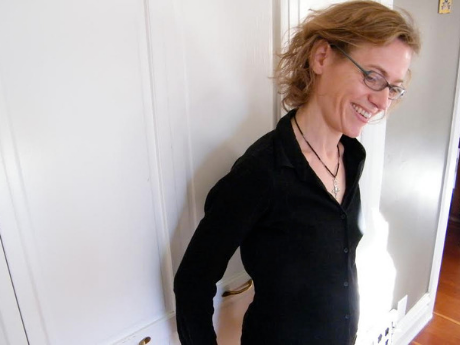In Their Own Words
Julie Carr's “Rag” (an excerpt)

Rag (an excerpt)
In crayon drawings
Some persons lie buried in fire and some have been suspended in a wave
Rain withdraws its praise
I'm unable to rest, her hunger crying through a vent
I wanted to unzip her coat, to slide a hand
Under the body of a car
But I was never one to fix a machine. Elsewhere the nest of the wasp
Other, the birch-bark and lichen
The townhouses stunned by foreclosure
The bubbling well in the mall
Now are we wanting plaster surrogates
To gather nightly in our halls?
"Like a maelstrom with a notch"
This world can dizzy even a womb
And mine is just a bit of breathing
A bit of breathing through a line
Not because I'm humble, because I'm made
Made to be humiliated and to be adored
I've never until now sensed two terms
To stand closer together than these
To gather nightly in our erosions
Our data bases our platforms our diagrams
If that's how you want to think about it
If that's how you want to think about it
In the blue dusted dawn of a feast day
I'm certain to dissolve in the fever
Of what pours from your skull, o clarion sun
From Rag (Omnidawn Publishing, 2014). All rights reserved. Reprinted with the permission of the author.
On an excerpt from "Rag"
The central concern of Rag is violence against women and girls as it surfaces in film, fairy tale, daily life, the news. Against that, I wanted to record intimacies of all kinds, but especially between children and parents and between friends, as a response, maybe an answer, to such threat. This untitled poem form the book addresses the precariousness of individual lives—this feeling, which lurks around the edges of things, and sometimes asserts itself in malls, neighborhoods, and families—that we are only dispensable.
>The opening two lines of this poem from the book describe drawings made by my daughter that struck me as rather apocalyptic. The longing to fix things, for intimacy as healing, arises briefly, but the poem quickly turns back to the feeling of crisis and abandonment, though now the focus is out in the world: the neighborhood, the mall. When the poem shifts back inwards, it's toward the body as "foreclosed upon," toward the position of the female as at once adored and humiliated. At the end of the poem the words "erosion" and "dissolve" form the emotional ground. In the economy of exploitation and waste, the human is devalued, temporary, expendable.


